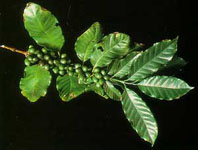Glossary:AA Acidity Acrid Affogato After Dinner Roast Aftertaste Aged Coffee Air Roaster Alkaline Altura Altura Coatepec American Roast Americano Antestia Arabian Mocha Arabica Aroma Artisan Coffee Arusha Ashy Aspiration Astringent Baggy Baked Balance Bani Bar Bar System Barista Batch Roaster Bean Probe Bean Temperature Beneficio Bird Friendly Biscotti Bits Bitter Black and White Black Beans Black Eye Black Russian Blade Grinder Blend Blotchy Blue Mountain Boat Shaped Body Boiler Bouquet Bourbon Bourbon Santos Brazil Bready Breve Brewing Bright Briny Bugisu Bullhead Burr Grinder Cafe Cafe au Lait Cafe Bonbon Cafe Noisette Caffe Caffeine Cappuccino Caramelly Carbony Caturra CBB Damaged Chaff Chiapas Chicory Chipinge Chocolatey Cinnamon Roast Citrus City Roast Clean Coatepec Coffea Canephora Coffee Berry Borer Coffee Cherry Coffee Fest Coffee Future Coffee Kids Coffee Leaf Rust Colombia Complexity Costa Rica Crema Crushed Crust Cultivar Current Crop Cyclone Separator Dark Roast Decaffeinated Demitasse Diseased Dominican Republic Doppio Dose Doser Doser Grinder Double Drip Coffee Drip Tray Drought Affected Drum Roaster Dry Dry Process Earthy El Salvador Elephant Beans Espresso Espresso con Panna Espresso Granita Espresso Machine Espresso Pod Espresso Romano Estate Ethiopia Ethiopia Harar Ethiopia Sidamo Ethiopia Yirgachefe Excelso Faded Fair Trade Fazenda Ferment Filter Basket First Crack Flat Flavored Coffee Floaters Floral Foxy French Press French Roast Freshness Frothing Fruity Gelato Gicleur Gourmet Coffee Grade Grande Grassy Green Coffee Grind Grounds for Health Group Guatemala Guatemala Antigua Guatemala Coban Guatemala Huehuetenango Half Caf Hard Bean Harmless Harsh Harvest Machine Harvesting Hawaii Herbal Hidey Honduras Hulling Iced Latte Iced Mocha ICO India India Monsoon Indonesia Instant taste Irish Coffee Italian Roast Jamaica Java Kenya Knock Box KVW Latte Latte Art Macchiato Malty Medicinal Medium Roast Mellow Methyl Chloride Mexico Mocha Java Mocha Latte Moldy Monsooned Mottled Musty Neutral New Crop Nicaragua No Fun Nose Nutty Oniony Organic Outer Skin Over Fermented Pales Papery Papua New Guinea Parchment Parchment Coffee Past Crop Peaberry Peasy Peru Piston Espresso Machine Porta-Filter Primary tastes Processed Coffee Pulled Long Pulled Short Pulp Pulper Nipped Pulping Pyrolysis Quad Quaker Quakery Ragged Rancid Red Eye Ripe Coffee Roast Master Robusta Rubbery Rwanda SCAA Scorched Second Crack Semi Dry Process Shell Shot Silver Skin Single Origin Skinny Smooth Solo Sorting Sour Spicey Spot Price Steam Wand Steaming Pitcher Stinker Strictly Hard Bean Strictly Soft Bean Sulawesi Sumatra Supremo Swiss Water Process Taint Tall Tamper Tamping Tanzania Tobacco Turkish Coffee Uganda Under Dried Utz Certified Valve Bag Varietal Vente Vienna Roast Vietnam Water Purification Water Softening Wet Wet Mill Wet Process Whole Bean Winey With Legs Withered Woody Yemen Zimbabwe Coffee Glossary Categories:Drinks & Recipes Brewing Classification & Grading Bean Defects Plant Varieties Producing Countries Cupping & Tasting Farming & Processing Organizations & Certifications Roasting Coffees by Origin |
. |
Coffea Plant Varieties
| |||||||||
